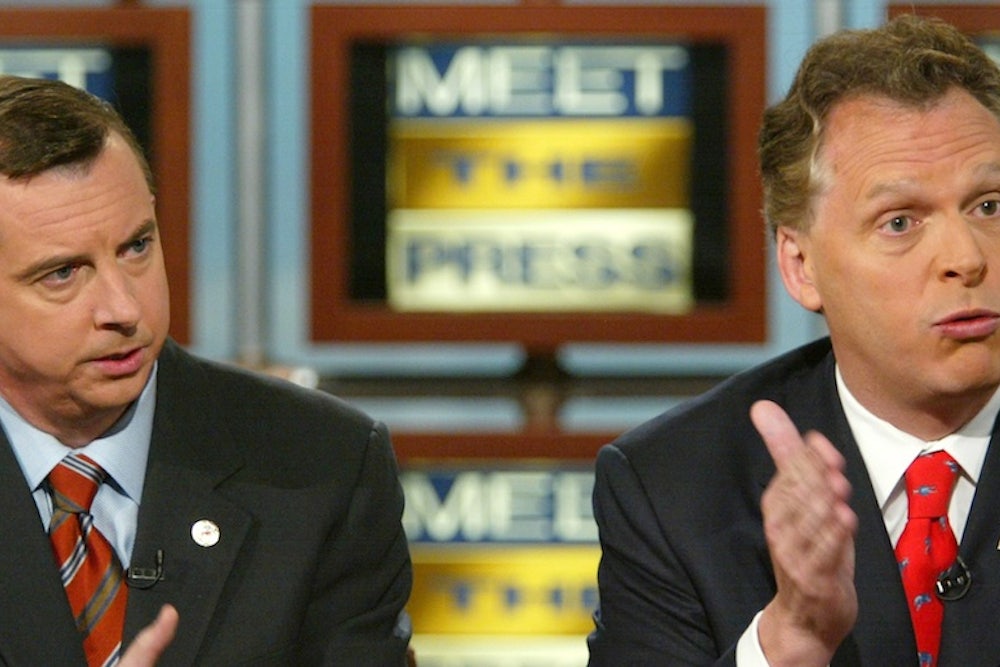Today, former Bush operative and tobacco lobbyist extraordinaire Ed Gillespie confirmed he is going to challenge Virginia Senator Mark Warner. This comes on the heels of news Monday that David Jolly, another lobbyist, had won the GOP primary in a special congressional election in Florida. And let's not forget the victory of Terry McAuliffe, the Democratic lobbyist and second-worst candidate in the Virginia gubernatorial race.
Three examples makes it a trend. But what, if anything, does it herald for the future of American politics? Will Congress eventually be dominated by empty-eyed, gladhanding walking grins whose only skills are flattering the rich and powerful, and raising obscene amounts of money?
The short answer: Yes, so we might as well get used to it.
Congress was never a place where high idealism triumphed. On the contrary, for most of American history it has been dysfunctional, foolish, racist, in thrall to special interests, awash in money, and often stunningly corrupt. But, at the risk of romanticizing the past, it used to be a place that basically functioned, if you define "functioning" as "passing enough legislation to keep the country tottering along, usually after every other possibility was exhausted, and maybe even making things a little better for people every once in awhile." It was exciting, for boring people at least, a place where ambitious strivers came for a career in political adventure and accomplishment.
But things have changed. Increasingly Congress has stopped doing anything at all, let alone anything positive, and became a place where not blowing up the world financial system for no reason is a success, and passing a budget like responsible countries do on a routine basis counts as a major accomplishment. And even then, everyone hates you for it anyway. Congress has rarely been well-liked, but it keeps setting new records in unpopularity—in November its approval rating was a record-low nine percent. Which only prompted one question: Who are these nine percent of people?
What's more, the stupendous sums needed for a modern campaign, driven by Citizens United and the unintended consequences of the McCain-Feingold campaign finance reform law, have turned our representatives' daily lives into one of endless begging for money. After the election, Ryan Grim and Sabrina Siddiqui wrote about the grim experience awaiting newly elected congressmen:
The daily schedule prescribed by the Democratic leadership contemplates a nine or 10-hour day while in Washington. Of that, four hours are to be spent in "call time" and another hour is blocked off for "strategic outreach," which includes fundraisers and press work. An hour is walled off to "recharge," and three to four hours are designated for the actual work of being a member of Congress — hearings, votes, and meetings with constituents. If the constituents are donors, all the better…It is considered poor form in Congress — borderline self-indulgent — for a freshman to sit at length in congressional hearings when the time could instead be spent raising money…
"What’s my experience with it? You might as well be putting bamboo shoots under my fingernails," said Rep. John Larson (D-Conn.), a high-ranking Democrat.
Terry McAuliffe might not be terribly principled. But one thing he can do better than all but a handful of living humans is raise money—thanks to his utter shamelessness. Consider the time he, by his own admission, left his wife and literally newborn son in the car to raise money for the Democrats:
We got to the dinner and by then Dorothy was in tears, and I left her with Justin and went inside. Little Peter was sleeping peacefully and Dorothy just sat there and poor Justin didn’t say a word. He was mortified. I was inside maybe fifteen minutes, said a few nice things about Marty, and hurried back out to the car. I felt bad for Dorothy, but it was a million bucks for the Democratic Party and by the time we got home and the kids had their new little brother in their arms, Dorothy was all smiles and we were one big happy family again. Nobody ever said life with me was easy.
If the lobbyist-turned-politician trend continues, how much will it actually change on the Hill? After all, parties are getting better and better at enforcing ideological discipline. Devoid of any principle except their own advancement, lobbyists will serve as little more than a precisely calibrated measurement of the political influence of various interest groups and pressure groups. So to the extent that the country is well-served by actual ideological competition, lobbyist-politicians will be a reasonable proxy.
That's the sunniest interpretation imaginable, anyway. Realistically, more lobbyist-politicians means more looted taxpayer cash stuffing plutocrats' pockets. These brave new politicians won't, by themselves, destroy the republic, but a Congress dominated by these money vacuums will probably be hell for the American people. Just wait until a grinning President McAuliffe signs the Chinese Lead-Based Toy Deregulation Act of 2024.
